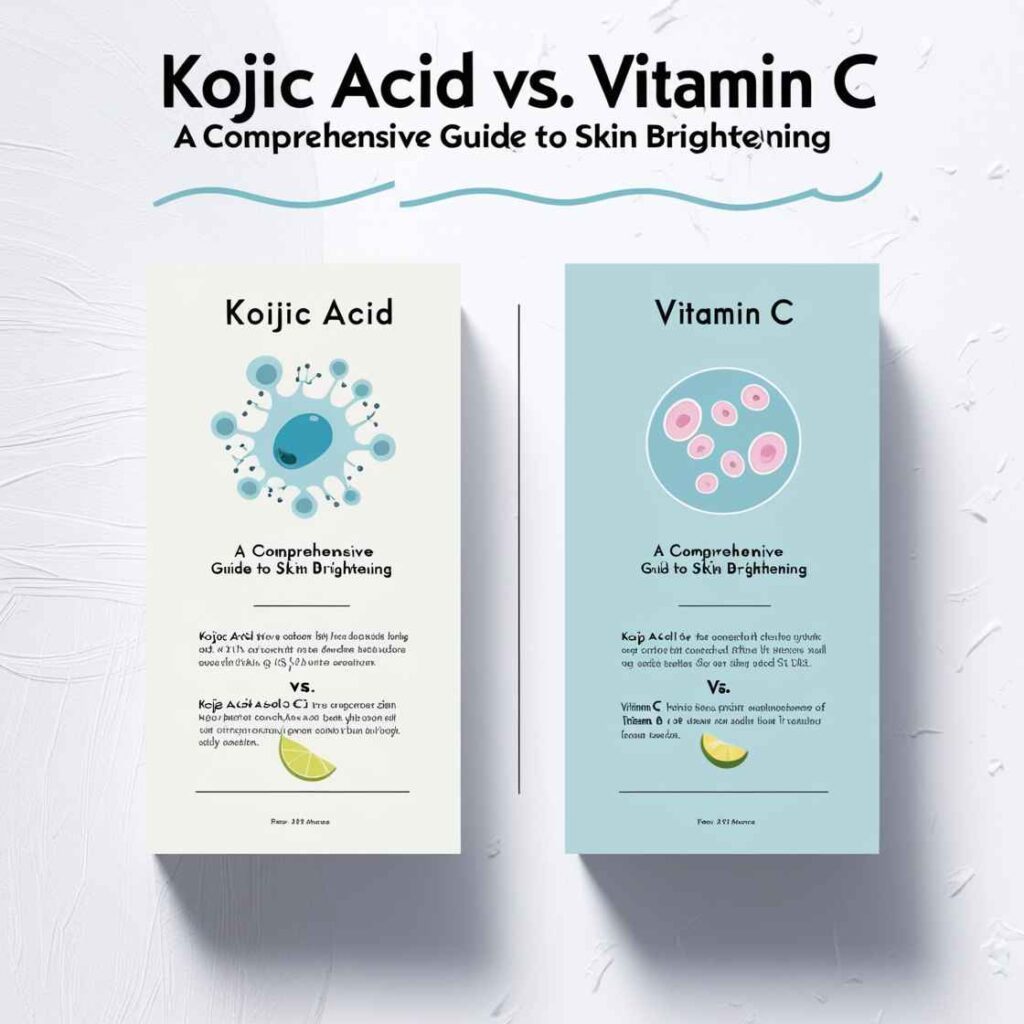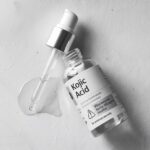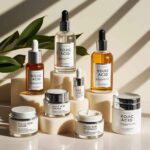- Kojic Acid inhibits melanin production, making it effective for hyperpigmentation.
-
Vitamin C brightens and protects skin from environmental damage.
-
Sensitive skin? Vitamin C may be the gentler option.
-
Acne-prone skin? Kojic Acid could be a better fit due to its antibacterial properties.
-
Using both ingredients together enhances their brightening and anti-aging effects.
Skin brightening is one of the hottest topics in skincare, and two ingredients frequently top the list are kojic Acid and Vitamin C. According to studies, both ingredients may improve skin tone, reduce dark spots, and promote overall skin health. But which one works best for your skin type and concerns? Here is the science behind these two powerhouses to help you decide which might be right for you. Let’s dive in!
Brighten Up: Natural Alternatives to Kojic Acid for Skin Lightening
Understanding the Mechanism of Kojic Acid and Vitamin C
When it comes to skin brightening, Kojic Acid and Vitamin C work through entirely different mechanisms. Knowing how they function can help you understand which one to incorporate into your skincare routine.
Kojic Acid:
Derived from fungi, kojic acid works by inhibiting the enzyme tyrosinase. This enzyme is responsible for melanin production, the pigment that causes skin to darken. By blocking tyrosinase, Kojic Acid prevents melanin production, leading to a reduction in dark spots. Kojic Acid also has antioxidant properties that help neutralize free radicals, giving it anti-aging benefits as well.
Vitamin C:
Also known as ascorbic acid, Vitamin C works differently. While it doesn’t directly inhibit melanin production, vitamin C has antioxidant properties that protect the skin from UV radiation and pollution. It also neutralizes free radicals that can cause dark spots and skin aging. Another benefit of vitamin C is its ability to promote collagen synthesis, which helps maintain skin firmness and elasticity.
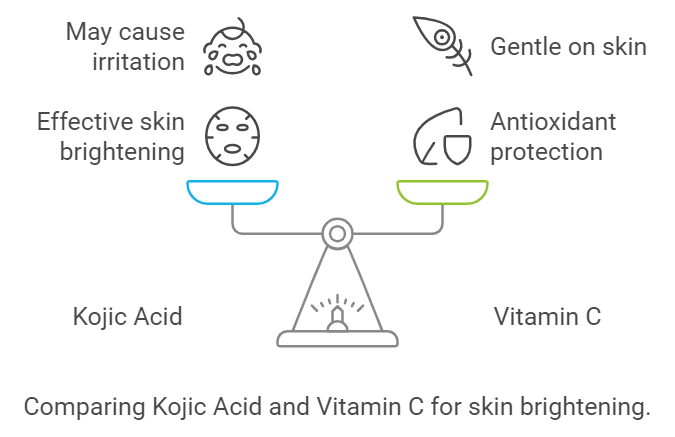
Which Ingredient is More Effective for Skin Brightening?
Kojic Acid is often the go-to for tackling specific areas of hyperpigmentation. It has been studied for its ability to reduce dark spots caused by melasma, sun damage, and acne scars. Users often notice improvements within weeks of consistent application. Kojic acid’s direct action on melanin production makes it effective for treating stubborn pigmentation issues.
Vitamin C, on the other hand, is generally better for overall skin radiance. While it may not target dark spots as aggressively as Kojic Acid, it offers broader benefits for skin health, including a gradual brightening effect. With regular use, vitamin C may fade dark spots, but it typically takes longer to show results compared to Kojic Acid.
Suitability for Different Skin Types
Choosing between Kojic Acid and Vitamin C depends largely on your skin type and sensitivity. Let’s take a closer look:
Sensitive Skin:
If you have sensitive skin, Vitamin C is usually the safer option. It’s gentler on the skin and causes less irritation. There are formulations specifically designed for sensitive skin, which ensure you get the brightening benefits without the sting.
Acne-Prone Skin:
If you have acne-prone skin, you might want to consider Kojic Acid. It not only helps lighten post-inflammatory hyperpigmentation (the dark spots left behind by acne) but also has antibacterial properties that can prevent future breakouts. However,kojic acid may be irritating, especially at higher concentrations, so it’s essential to start with a lower percentage and gradually increase use.
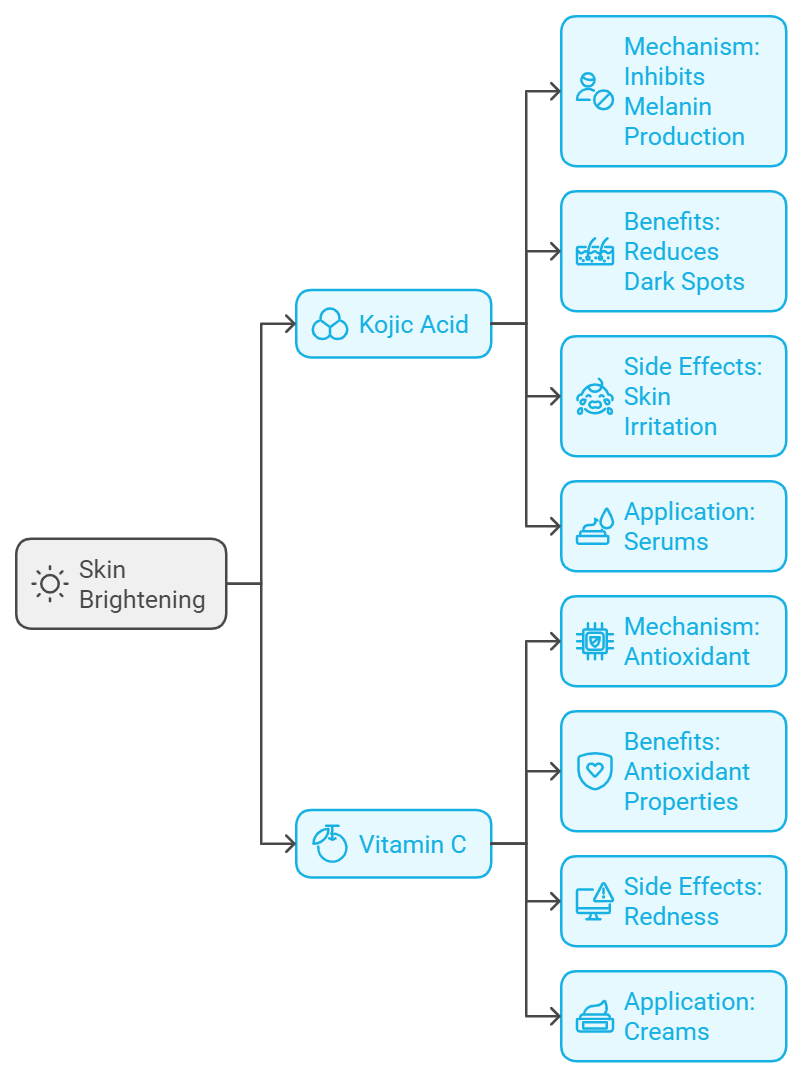
The Power of Combining Kojic Acid and Vitamin C
Why choose one when you can have both? Many dermatologists suggest using Kojic Acid and Vitamin C together for even better results. By combining these two ingredients, you get the best of both worlds—Kojic Acid’s melanin-inhibiting effects paired with Vitamin C’s antioxidant protection and collagen-boosting benefits.
Here’s how the combination works:
-
Kojic Acid blocks melanin production, reducing dark spots and discoloration.
-
Vitamin C enhances skin brightness and protects against further damage caused by environmental stressors like UV rays and pollution.
This combination can deliver more comprehensive brightening results and improve skin texture and radiance.
Potential Side Effects: What to Watch Out For
While both ingredients are generally safe, there are a few potential side effects to consider, especially if you have sensitive skin or are new to using active ingredients.
Kojic Acid:
In concentrations higher than 1%, Kojic Acid can cause irritation, redness, or even contact dermatitis. If you’re new to it, start with a product containing a lower concentration and patch test it before using it on your face.
Vitamin C:
High concentrations of Vitamin C can also cause irritation, especially if you have sensitive skin. Some users experience redness or a stinging sensation upon application. If this happens, look for Vitamin C products formulated with lower concentrations or buffered with hydrating ingredients to reduce irritation.
How Long Before You See Results?
Consistency is key with both Kojic Acid and Vitamin C. Neither ingredient will work overnight, but the timeline for results can vary between the two.
Kojic Acid:
You can expect to see improvements in dark spots and overall skin tone within 4-8 weeks of regular use. Results are often more noticeable in targeted areas of hyperpigmentation.
Vitamin C:
With Vitamin C, improvements in skin brightness and radiance generally take 8-12 weeks to become evident. Fading of dark spots might take even longer, depending on the severity of the pigmentation.
Other Skin Lightening Ingredients to Consider
While Kojic Acid and Vitamin C are powerful brightening agents, there are other ingredients worth considering in your quest for glowing skin. Here are a few you might want to explore:
-
Niacinamide: A form of Vitamin B3, niacinamide is known for its ability to reduce redness, improve the skin barrier, and even out skin tone. It’s gentle and pairs well with both Kojic Acid and Vitamin C.
-
Alpha Arbutin: Another natural skin-brightening ingredient, alpha arbutin is derived from the bearberry plant. It works by inhibiting tyrosinase, just like Kojic Acid, and is often used in combination with other brighteners.
-
Licorice Root Extract: Known for its soothing properties, licorice root also helps to lighten hyperpigmentation and calm inflamed skin.
How to Incorporate These Ingredients Into Your Routine
Now that we’ve covered the benefits of both Kojic Acid and Vitamin C, let’s discuss how to incorporate them into your skincare routine effectively.
-
Kojic Acid: Kojic Acid is best applied in the evening after cleansing and before moisturizing. Start with lower concentrations and work your way up as your skin builds tolerance.
-
Vitamin C: Vitamin C is best applied in the morning after cleansing and before sunscreen. Its antioxidant properties help protect the skin from environmental damage during the day. Look for stabilized formulations to ensure the Vitamin C remains potent.
Conclusion
Both Kojic Acid and Vitamin C have their strengths when it comes to skin brightening. Kojic Acid is particularly effective for targeted treatment of hyperpigmentation, making it a great choice for those with dark spots or melasma. Vitamin C, while more of a general brightening agent, offers extensive benefits for overall skin health, from boosting radiance to improving collagen production. Combining the two ingredients yields the best results, offering a balance of protection, brightening, and anti-aging benefits.
Source:
https://www.ncbi.nlm.nih.gov/pmc/articles/PMC10094916/

I’m a devoted organic skincare enthusiast, passionate about the natural, wholesome goodness that organic products bring to our skin.
Organic skincare isn’t just a hobby for me—it’s a lifestyle. Every product I use, recommend, and write about has been carefully chosen for its purity and effectiveness. Everything I write about is backed by scientific studies, dermatologists’ opinions, and user experiences.
I also excel at tackling skincare challenges with innovative, organic solutions.
